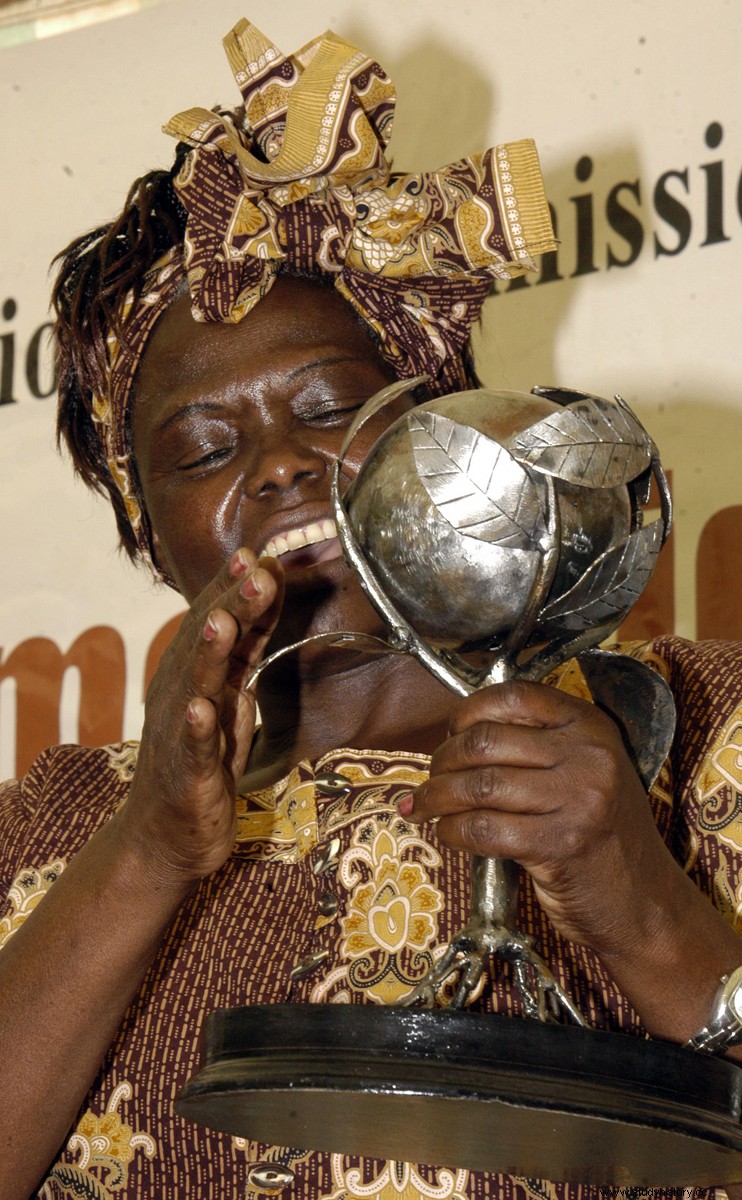Wangari Muta Maathai (1940 – 2011) is a Kenyan scientist, known for her political commitment to sustainable development and peace. She was the first African woman to receive the Nobel Peace Prize in 2004.
A young girl gifted for studies

Wangari Muta Maathai was born on April 1, 1940 in Ihithe, near the town of Nyeri, in the central highlands of Kenya. Her parents, farmers from the majority Kikuyu people in Kenya, have five children after her. Progressive, his family sent him to school, which was not so common at the time for a girl. Wangari enters primary school in Ihithe and then follows her secondary studies in a girl's school in Limuru, the Loreto Convent.
Proving to be intelligent, gifted for studies, Wangari obtained in 1959, with the support of her professors, a scholarship to complete her studies in the United States. She then studied in Kansas, where she obtained a degree in biology in 1964, then in Pittsburgh, Pennsylvania. This experience also allowed her to witness the struggles of black Americans against racial discrimination, which left a deep mark on her.
The creation of Green Belt
In 1966, Wangari Muta Maathai moved to Germany for a while to work at the University of Munich, then returned to Kenya, three years after the country's independence, to work as a research assistant in veterinary medicine. It was there that, in 1971, she obtained her doctorate. Subsequently, she became a teacher of veterinary anatomy, the first black woman to become a professor in Kenya, then dean of the faculty. Married, she has three children:Waweru, Wanjira and Muta.
Wangari is interested in women's rights issues, but also in the environmental cause. In 1977, on Earth Day, she planted seven trees in tribute to women engaged in the defense of the environment in Kenya, and created Green Belt to "promote respect for human rights, good governance and democracy ". Originally, the association included only women who engaged in the reforestation of devastated areas, then gradually opened up to men. Since its inception, the movement is said to have planted over thirty million trees, earning Wangari the nickname "tree woman." She is also the leader of "Maendeleo ya wanawake (National Women's Council of Kenya).
Commitments in politics
In 1979, Wangari Muta Maathai's husband divorced and the separation ended in court. The judge then agrees with Wangari's husband, who assures us that she has too strong a character and that he cannot control her. The founder of Green Belt will then spend a few days in prison for having declared, in the press, that the judge must be corrupt or incompetent. The episode caused a scandal and put an end to Wangari's university career; the university that employed him fired him.
After the accession to the presidency of Daniel arap Moi, Wangari regularly opposes his policies and his regime. Injured several times during demonstrations, she again made several stays in prison. In 1997, she ran for the Kenyan presidential elections but her party withdrew her candidacy. At the end of the 1990s, she vigorously and successfully opposed the project to build a sixty-storey tower in the middle of a park in Nairobi, a construction that would have required cutting down many trees. She manages to get the donors to withdraw from the project but, following the violent evacuation of the premises of her association by the police, has to flee to Tanzania for a while. His commitments in politics and in favor of the environment will earn him other violence, up to a stay in hospital following a demonstration. Wangari fights tirelessly for democracy and the environment.
In 2002, Daniel arap Moi left power and Wangari was appointed Deputy Minister for the Environment, Natural Resources and Wildlife; a position she held until 2005. She founded the Green Party Mazingira and was elected to the Kenyan parliament in 2003. That same year, she sparked controversy by declaring, about AIDS, that it was created by a scientist for biological warfare. Subsequently, she will return to these remarks and claim to have been misunderstood.
In 2004, for her actions in favor of democracy and the environment, Wangari Muta Maathai became the first African woman to receive the Nobel Peace Prize. She died of cancer on September 25, 2011 in Nairobi, following cancer.
